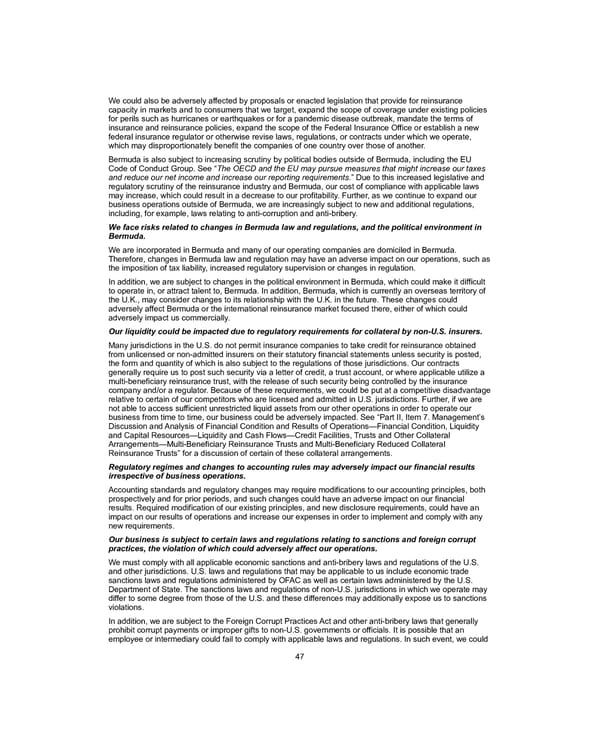We could also be adversely affected by proposals or enacted legislation that provide for reinsurance capacity in markets and to consumers that we target, expand the scope of coverage under existing policies for perils such as hurricanes or earthquakes or for a pandemic disease outbreak, mandate the terms of insurance and reinsurance policies, expand the scope of the Federal Insurance Office or establish a new federal insurance regulator or otherwise revise laws, regulations, or contracts under which we operate, which may disproportionately benefit the companies of one country over those of another. Bermuda is also subject to increasing scrutiny by political bodies outside of Bermuda, including the EU Code of Conduct Group. See “ The OECD and the EU may pursue measures that might increase our taxes and reduce our net income and increase our reporting requirements .” Due to this increased legislative and regulatory scrutiny of the reinsurance industry and Bermuda, our cost of compliance with applicable laws may increase, which could result in a decrease to our profitability. Further, as we continue to expand our business operations outside of Bermuda, we are increasingly subject to new and additional regulations, including, for example, laws relating to anti-corruption and anti-bribery. We face risks related to changes in Bermuda law and regulations, and the political environment in Bermuda. We are incorporated in Bermuda and many of our operating companies are domiciled in Bermuda. Therefore, changes in Bermuda law and regulation may have an adverse impact on our operations, such as the imposition of tax liability, increased regulatory supervision or changes in regulation. In addition, we are subject to changes in the political environment in Bermuda, which could make it difficult to operate in, or attract talent to, Bermuda. In addition, Bermuda, which is currently an overseas territory of the U.K., may consider changes to its relationship with the U.K. in the future. These changes could adversely affect Bermuda or the international reinsurance market focused there, either of which could adversely impact us commercially. Our liquidity could be impacted due to regulatory requirements for collateral by non-U.S. insurers. Many jurisdictions in the U.S. do not permit insurance companies to take credit for reinsurance obtained from unlicensed or non-admitted insurers on their statutory financial statements unless security is posted, the form and quantity of which is also subject to the regulations of those jurisdictions. Our contracts generally require us to post such security via a letter of credit, a trust account, or where applicable utilize a multi-beneficiary reinsurance trust, with the release of such security being controlled by the insurance company and/or a regulator. Because of these requirements, we could be put at a competitive disadvantage relative to certain of our competitors who are licensed and admitted in U.S. jurisdictions. Further, if we are not able to access sufficient unrestricted liquid assets from our other operations in order to operate our business from time to time, our business could be adversely impacted. See “Part II, Item 7. Management’s Discussion and Analysis of Financial Condition and Results of Operations—Financial Condition, Liquidity and Capital Resources—Liquidity and Cash Flows—Credit Facilities, Trusts and Other Collateral Arrangements—Multi-Beneficiary Reinsurance Trusts and Multi-Beneficiary Reduced Collateral Reinsurance Trusts” for a discussion of certain of these collateral arrangements. Regulatory regimes and changes to accounting rules may adversely impact our financial results irrespective of business operations. Accounting standards and regulatory changes may require modifications to our accounting principles, both prospectively and for prior periods, and such changes could have an adverse impact on our financial results. Required modification of our existing principles, and new disclosure requirements, could have an impact on our results of operations and increase our expenses in order to implement and comply with any new requirements. Our business is subject to certain laws and regulations relating to sanctions and foreign corrupt practices, the violation of which could adversely affect our operations. We must comply with all applicable economic sanctions and anti-bribery laws and regulations of the U.S. and other jurisdictions. U.S. laws and regulations that may be applicable to us include economic trade sanctions laws and regulations administered by OFAC as well as certain laws administered by the U.S. Department of State. The sanctions laws and regulations of non-U.S. jurisdictions in which we operate may differ to some degree from those of the U.S. and these differences may additionally expose us to sanctions violations. In addition, we are subject to the Foreign Corrupt Practices Act and other anti-bribery laws that generally prohibit corrupt payments or improper gifts to non-U.S. governments or officials. It is possible that an employee or intermediary could fail to comply with applicable laws and regulations. In such event, we could 47
 2021 Annual Report Page 62 Page 64
2021 Annual Report Page 62 Page 64